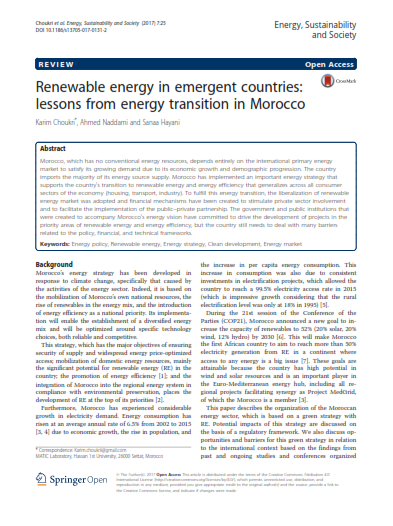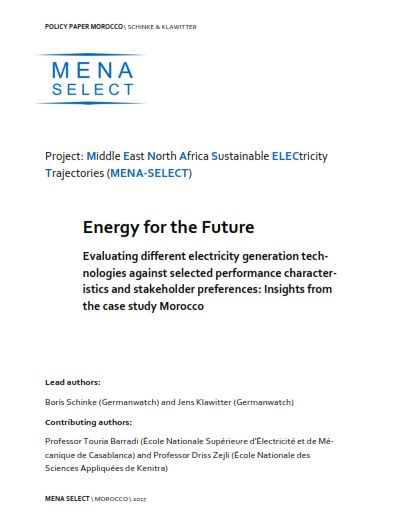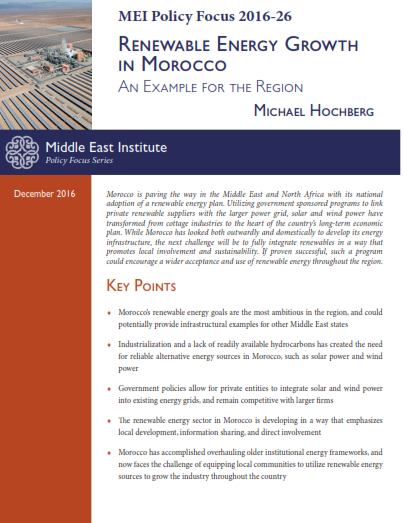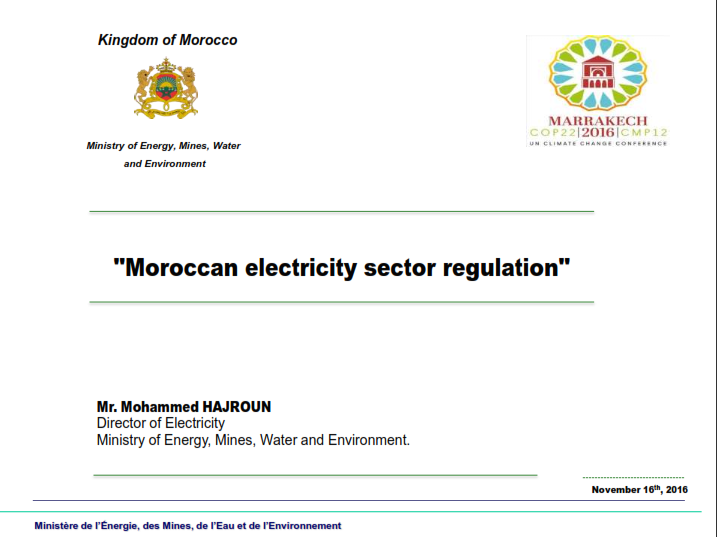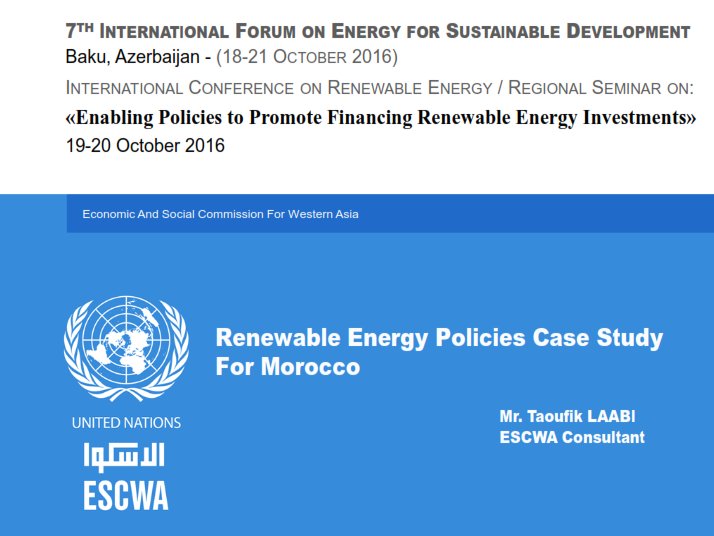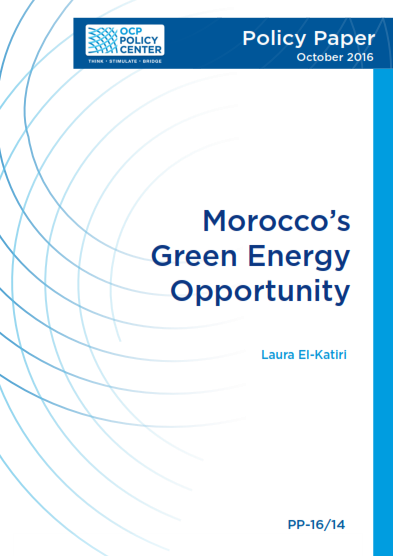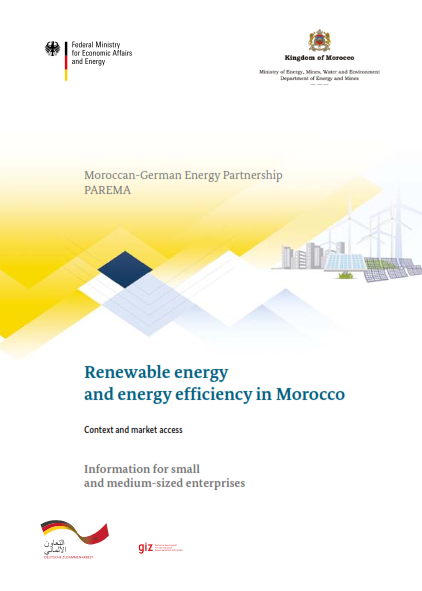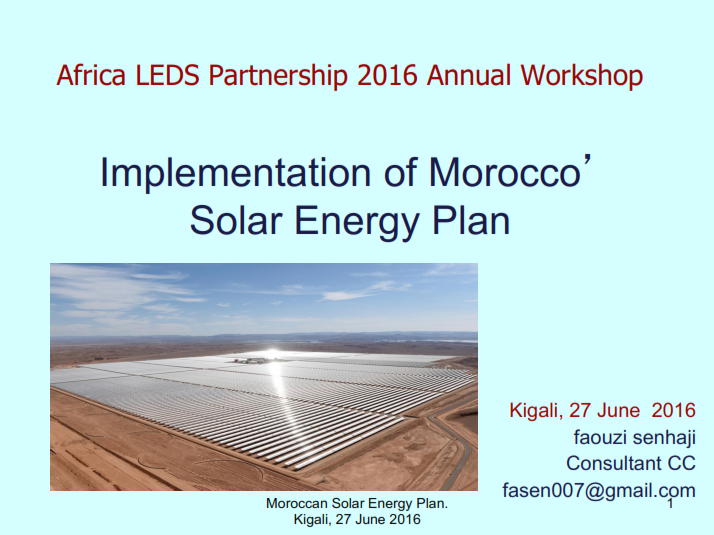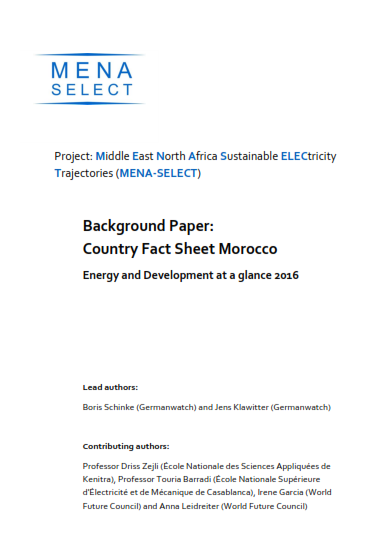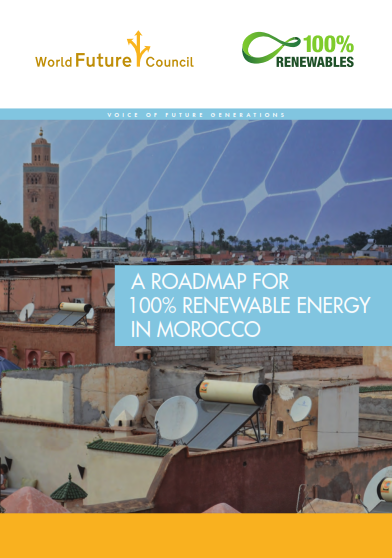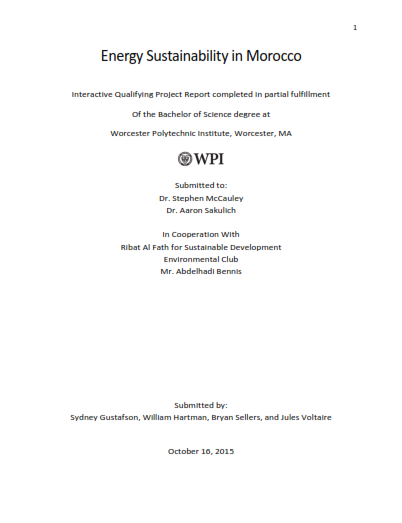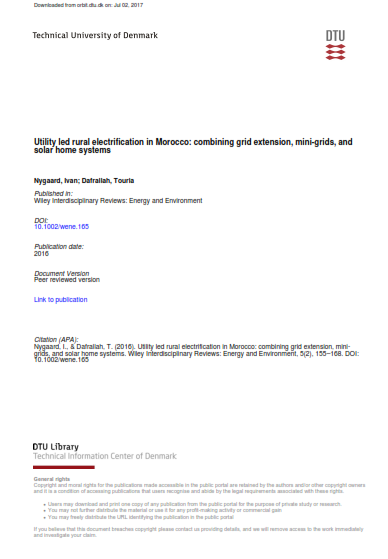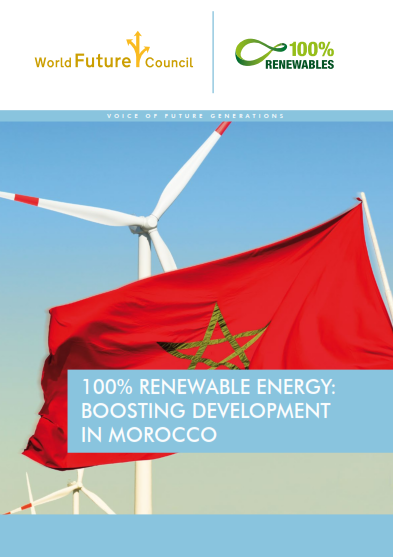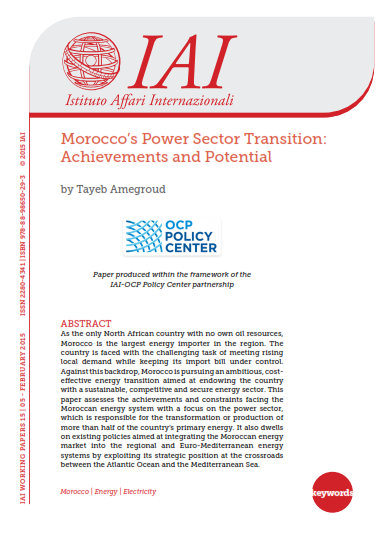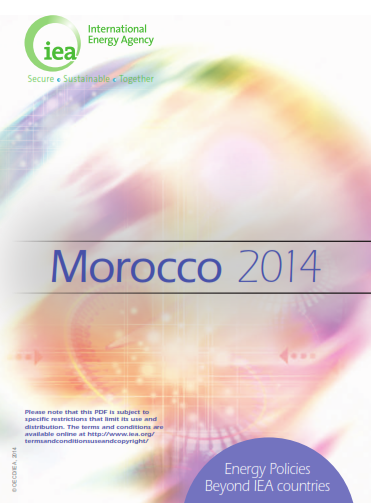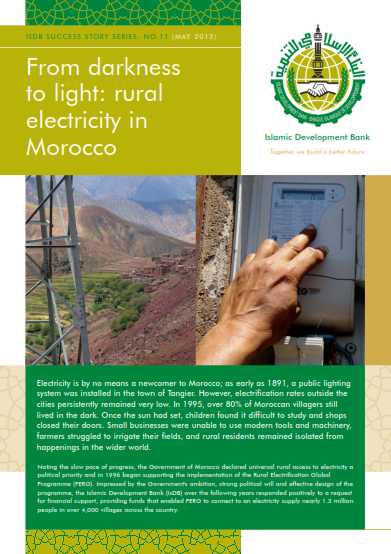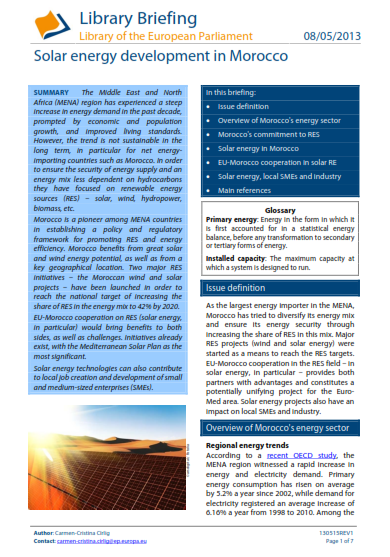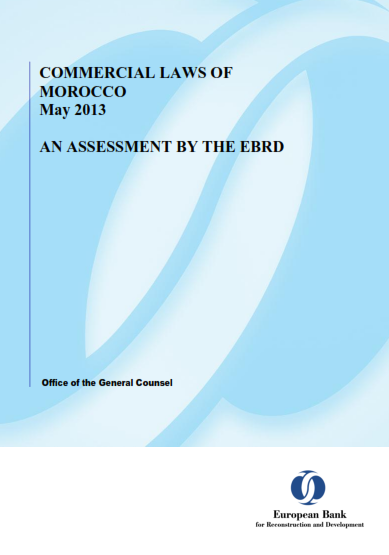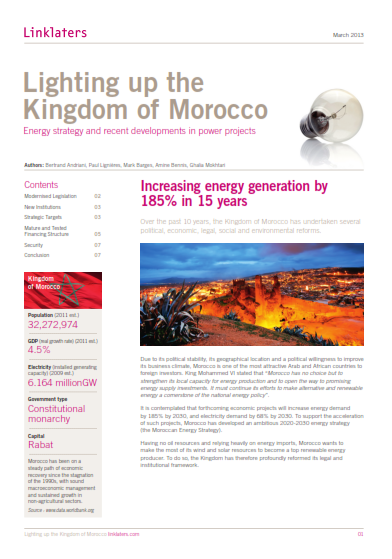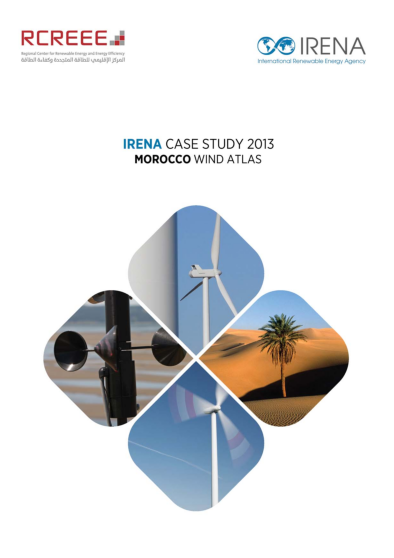We post here the relevant reports for the power sector in Morocco. Feel free to join our efforts and share us any other you may have found. We'd be glad to add them to the list. Just send an email to This email address is being protected from spambots. You need JavaScript enabled to view it.
Publication date: 2017, September
Author: Springer Open
Description: Morocco, which has no conventional energy resources, depends entirely on the international primary energy market to satisfy its growing demand due to its economic growth and demographic progression. The country imports the majority of its energy source supply. Morocco has implemented an important energy strategy that supports the country’s transition to renewable energy and energy efficiency that generalizes across all consumer sectors of the economy (housing, transport, industry).
Download Report >>
Visit Website >>
Publication date: 2017, July
Author: MENA Select
Description: Morocco’s future electricity consumption is projected to increase rapidly. This will require the deployment of additional electricity generation capacities with volumes four times higher by 2030 and more than ten times higher by 2050 compared to available capacities today. Hence, the major part of the country’s electricity infrastructure is still to be built and substantial investments in additional power generation capacities are yet to be made.
Download Report >>
Publication date: 2016, December
Author: MEI
Description: Morocco is paving the way in the Middle East and North Africa with its national adoption of a renewable energy plan. Utilizing government sponsored programs to link private renewable suppliers with the larger power grid, solar and wind power have transformed from cottage industries to the heart of the country’s long-term economic plan. While Morocco has looked both outwardly and domestically to develop its energy infrastructure, the next challenge will be to fully integrate renewables in a way that promotes local involvement and sustainability. If proven successful, such a program could encourage a wider acceptance and use of renewable energy throughout the region.
Download Report >>
Visit Website >>
Publication date: 2016, November
Author: MEMWE
Description: Energy today has to be: Sustainable; Secure; Affordable.
Download Report >>
Publication date: 2016, October
Author: ESCWA
Description: Table of Content:
- Country Brief;
- Energy Sector Characteristics;
- Renewable Energy Potential;
- Current policy status (Renewable energy strategy; Renewable energy targets; Policy and Institutional framework);
- Impact of the policy measures;
- Policy Design Considerations;
- Barriers to implement RE;
- Conclusion and recommendations.
Download Report >>
Publication date: 2016, October
Author: OCP
Description: Morocco’s energy landscape has been changing rapidly over the past decades. Alongside its own population growth, rising access rates to electricity as well as high rates of rural-urban migration and rising living standards, Morocco’s domestic energy needs have risen sharply since the early 1990s. This policy paper explores Morocco’s long-term energy options, focusing on “green” energy solutions that lie within Morocco’s natural competitive advantage.
Download Report >>
Publication date: 2016, October
Author: GTZ / GIZ
Description: There has been a bilateral energy partnership in place between the Kingdom of Morocco and the Federal Republic of Germany since 2012. Serving as a platform for high-level policy dialogue between the two countries, it identifies and strengthens common points, draws together activities and actors and encourages private-sector involvement. The German-Moroccan Energy Partnership aims to provide investors with information on the Moroccan market, so that they can identify opportunities and prospects in a timely manner. It is to this end that this brochure has been published by the Secretariat for Implementation of the German-Moroccan Energy Partnership, hosted by the Renewable Energy and Energy Efficiency Department (DEREE) of the Moroccan Ministry of Energy, Mining and Sustainable Development (MEMDD).
Download Report >>
Publication date: 2016, June
Author: Faouzi Senhaji
Description: Outline:
- Morocco in few numbers;
- Moroccan Institutions in the Energy Sector;
- The legal framework;
- The Moroccan ‘Solar Energy Plan’ (NOOR);
- Programmes of the ‘Solar Energy Plan’;
- Implementation of the SEP by MASEN.
Download Report >>
Publication date: 2016, April
Author: MENA Select
Description: Reliable energy supply is vitally important to meet the growing electricity demand and hence to sustain the socio-economic progress of Morocco. With the kingdom's electricity consumption projected to double by 2025 and to increase more than five times by 2050, substantial investments in additional power generation capacities are required. Faced by the dual challenge of importing 96% of its energy supplies as fossil fuels from abroad, and being highly vulnerable to the effects of climate change, Morocco has, therefore, explicitly set low-carbon and climate change resilient development as its strategic development priority.
Download Report >>
Visit Website >>
Publication date: 2016
Author: World Future Council
Description: Morocco, COP22 host country, has since 2009 prioritised renewable energies and energy efficiency. Aware of the nature of the opportunities and stakes confronting its energy landscape, the nation has mobilised to share the message about the urgency and advisability of changing the pathway.
Download Report >>
Visit Website >>
Publication date: 2015, October
Author: WPI
Description: Morocco imports 96% of its energy, threatening its energy security. To combat this, 2,000 MW each of solar, wind, and hydroelectric power are planned. Energy conservation efforts have been initiated with mixed success. This report outlines Morocco’s energy strategy, evaluating its successes and failures. Recommendations were made to reduce energy use, implement local-scale projects, pursue global collaboration, and promote research and development in renewable technology. This report will guide Ribat Al Fath in influencing Moroccan energy policy.
Download Report >>
Publication date: 2015, March
Author: DTU
Description: Morocco has become known for being an example of a well-performing utility-led rural electrification program, but so far little independent research has scrutinized this extraordinary case. Based on a critical review of the available literature this paper attempts to draw a picture of the evolution of rural electrification in Morocco, the policies and programs that have been implemented, and their institutional, technical and financial dimensions.
Download Report >>
Visit Website >>
Publication date: 2015, March
Author: World Future Council
Description: In order to ensure the development of a more sustainable, environmentally responsible and overall more liveable planet, we need to radically transform our energy sector and pave our way towards a cleaner and more just future powered by 100% Renewable Energy. To achieve this transformation, policy makers play an important role. Providing policy makers and the various stakeholders with the opportunity to discuss the tools and best practises to achieve this transformation effectively is therefore crucial. With this in mind, the World Future Council sees its role in connecting the dots between legislators and experts willing to take action and to take leadership on this journey.
Download Report >>
Visit Website >>
Publication date: 2015, February
Author: IAI
Description: As the only North African country with no own oil resources, Morocco is the largest energy importer in the region. The country is faced with the challenging task of meeting rising local demand while keeping its import bill under control. Against this backdrop, Morocco is pursuing an ambitious, cost effective energy transition aimed at endowing the country with a sustainable, competitive and secure energy sector.
Download Report >>
Publication date: 2014, October
Author: iea
Description: Morocco is over 90% dependent on energy imports, so a major challenge is to develop indigenous resources. Topography and climate are favourable to wind, solar and additional hydropower. By 2020, Morocco aims to derive more than 40% of its electrical capacity from these sources, strengthening both energy security and sustainability. At the same time, Rabat aims to retain its attractive investment conditions for oil and gas exploration.
Download Report >>
Visit Website >>
Publication date: 2013, May
Author: ISB
Description: Electricity is by no means a newcomer to Morocco; as early as 1891, a public lighting system was installed in the town of Tangier. However, electrification rates outside the cities persistently remained very low. In 1995, over 80% of Moroccan villagers still lived in the dark. Once the sun had set, children found it difficult to study and shops closed their doors. Small businesses were unable to use modern tools and machinery, farmers struggled to irrigate their fields, and rural residents remained isolated from happenings in the wider world.
Download Report >>
Publication date: 2013, May
Author: EU
Description: The Middle East and North Africa (MENA) region has experienced a steep increase in energy demand in the past decade, prompted by economic and population growth, and improved living standards. However, the trend is not sustainable in the long term, in particular for net energy importing countries such as Morocco. In order to ensure the security of energy supply and an energy mix less dependent on hydrocarbons they have focused on renewable energy sources (RES) – solar, wind, hydropower, biomass, etc.
Download Report >>
Publication date: 2013, May
Author: EBRD
Description: Morocco is a constitutional monarchy with an elected parliament and a mixed legal system of civil law mainly based on French law with some influence from Islamic law. Legislative acts are subject to judicial review by the Supreme Court. The principal sources of commercial legislation in Morocco can be found in the Code of Obligations and Contracts of 1913, and Law No. 15-95 establishing the Commercial Code.
Download Report >>
Publication date: 2013, March
Author: Linklaters
Description: Over the past 10 years, the Kingdom of Morocco has undertaken several political, economic, legal, social and environmental reforms. Due to its political stability, its geographical location and a political willingness to improve its business climate, Morocco is one of the most attractive Arab and African countries to foreign investors. King Mohammed VI stated that “Morocco has no choice but to strengthen its local capacity for energy production and to open the way to promising energy supply investments. It must continue its efforts to make alternative and renewable energy a cornerstone of the national energy policy”.
Download Report >>
Publication date: 2012
Author: IRENA
Description: The Kingdom of Morocco is the only North African country with no natural oil resources and is the largest energy importer in the region with 96% of its energy needs being sourced externally. The leading supplier of Morocco’s energy requirements is Saudi Arabia at 48%. By 2011 Morocco’s energy bill had reached MAD 86 billion (approximately USD 10 billion); electricity demand in the country is projected to quadruple by 2030.
Download Report >>





